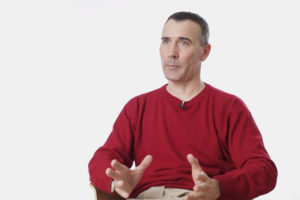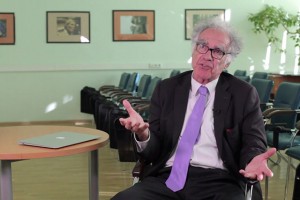Silk Road
Historian Valerie Hansen on cultural exchange, the history of the Silk Road, and the historical documents that...
How did a letter cause an opening of the Vatican’s Inquisition archives? What is contained in the Inquisition’s Central Archive? In what sense was the attitudes of the Inquisition towards forbidden books ambivalent? These and other questions are answered by Franklin D. Murphy Professor of Italian Renaissance Studies at UCLA Carlo Ginzburg.
The Inquisition is a medieval institution, but it underwent a deep change in the 16th century when the Christian Church was confronted by the Protestant Reformation. And so the medieval institution which was basically led by, on a local basis, by bishops, working with either Dominican or Franciscan friaries became a centralized institution.
So there was a congregation in Rome controlling through letters and so on the activity of local institutions. So, for instance, there was an inquisition in Venice, in Modena and so on. But then there was a central Institution in the Central Archive in Rome. And in Rome copies of the most important trials were sent, although the originals were kept in the local archives.
So I was unable to find the original, but I thought: well, apparently, the copy has been sent to Rome.
So I asked myself, well, the Central Archive in Rome has been heavily depleted – this we know – most of it was sent to Paris, then partially destroyed, a section of it was sent to Dublin, and is still there, in Trinity College of Dublin.
I was able to check the microfilms of the Dublin section, but there were still trials in Rome, but the Archive was not available to scholars. So I thought: “what should I do?” – well, if I’m going to send a sort of bureaucratic letter to the Central Archive asking for being admitted to consult those papers – there is no chance. So I thought, well, let’s write a personal letter to the Pope. The Pope was John Paul II. It was the first non-Italian Pope been elected after four centuries. So I thought, well he comes from a different background, I wrote a letter saying not “Sua santità”, or “Your Holiness”, but “Your Excellency” or something. “I am Jewish, I am an atheist, I am a historian, I’ve been working for many years on the Inquisition archives. I would like to consult a document related to the inquisition preserved in Rome and so on, and so forth. I think that opening that archive would be a gesture which would be important not only for scholars, but on a more general level showing that the Catholic Church is ready to submit itself to historical judgment. So this would be a gesture which would be important on a general level.
I got no answer. So I sent another letter to the Congregazione della Fede which was the new reincarnation of the old Congregation asking a more specific question – namely, to consult papers related to Costantinus Acardino and so on. I got an answer, which was, as I remember, signed by the Cardinal who was responsible for that Congregation at that time – meaning Cardinal Ratzinger, who later became Pope, of course. And so he said: “No, these documents are not here, but even if they would be here the scholars would be unable to consult them, because they are too sensitive”. And then I got an answer from the secretary of the Pope. So two letters. And the second letter said: “We understand your commitment to research (I thought it was sort of ironical undertow), but those documents are too sensitive, they cannot be consulted and so on”.
That was not the end of the story, because some years later the Pope, John Paul II, opened up the Central Archive to scholars. And there was a conference at the Accademia Nazionale dei Lincei. And I was invited. And I couldn’t attend the conference, as I explained in a letter, because I’d been invited in Cambridge to give a series of lectures. I received a phone call – it was a voice speaking perfect Italian with a slight Spanish accent. He said: “I am responsible for the former Archive of the Inquisition”… and so on. “Would you be able to attend the conference?” I said: “I am sorry, I already sent a letter. I couldn’t”. “Peccato (Too bad)”. And there was a personal overtone which I couldn’t understand. I said: “But why?” “Well, because your letter played a role…” “My letter?” (I had forgotten about a letter). I couldn’t understand which letter. And then he said: “Yeah, I understand, because such a long time elapsed”. Well, at that moment I recalled the letter, and I thought that this was really paradoxical, because for the Catholic Church a few years, ten years, mean just nothing. Okay, so the Archive had been opened and the archivist said: “Because your letter was important, played a role in the opening of the Archive”.
In fact, I’d been told there was an article in Italian newspaper saying that the beginning of my letter was read by Cardinal Ratzinger, not yet a Pope, at the Accademia Lincei. I mean, the section, the beginning “I’m Jewish, I’m an atheist, I’m a historian…”. Now, to be an atheist – that was completely irrelevant in that context, but to be Jewish was not irrelevant. So anyway, the Archive has been opened. I also worked in the archive and these are open to scholars. The section on trials is not particularly rich. It has been heavily depleted. But the section on forbidden books, for instance, this is very rich. I mean, there are filters, of course – not everybody can work. But scholars from different countries with an academic background can work in the archive.
The Inquisition Archives can be used for different purposes, of course. So, one may ask different questions. Historians of, let’s say, heresies or historians of, let’s say, attitudes towards censorship can find a lot of evidence in those trials. There are topics related to the inquisitor’s perception. But then,
trials can be used for different purposes by scholars looking for something which was marginal for the inquisitors, but is not marginal for contemporary historians.
So there is a kind of asymmetry, which is a part of the usual attitude towards historical evidence.
Among the topics which can be addressed starting from documents preserved in the Central Archive in Rome, documents related to the inquisition attitude towards forbidden books include, for instance, the early reactions to Spinoza’s Treatise – the theological, political Treatise. And all kinds of forbidden books, which, as we know since centuries, provide access to the Roman Church attitudes towards central trends in European philosophy. So the censorship battle was lost. That’s important. And what we can find in those documents is the history of that defeat. In so far as Voltaire was forbidden, but Voltaire was read across the world and so o and so forth. But it’s important to, let’s say, rescue the aggressive element which triggered the Catholic Church reaction. And I’d been working on Pascal’s “Provinciales”, and the attitude of the Catholic Church vis-à-vis Pascal, who was leading representative of the Jansenist tradition. The Catholic Church’s attitude was extremely ambivalent. Typically, the Catholic Church condemned the “Provinciales” as a text in vernacular, but the Latin translation was not included in the forbidden books. Why? Well, because what was important was to prevent ordinary people and especially women (that was forbidden very clearly) from having access to this kind of dangerous literature. But the elite, in that case, was allowed to have access to this kind of literature. So those people knew what they were doing. We are not dealing with blind people. On the contrary, they were trying to blind other people, but they knew what they were doing and what they were looking for.

Historian Valerie Hansen on cultural exchange, the history of the Silk Road, and the historical documents that...

Historian Richard Bourke on the components of nationalism, national identity, and the role of ideology and the...

Historian Carlo Ginzburg on the benandanti witches, clashes between medieval peasants and inquisitors, and the...